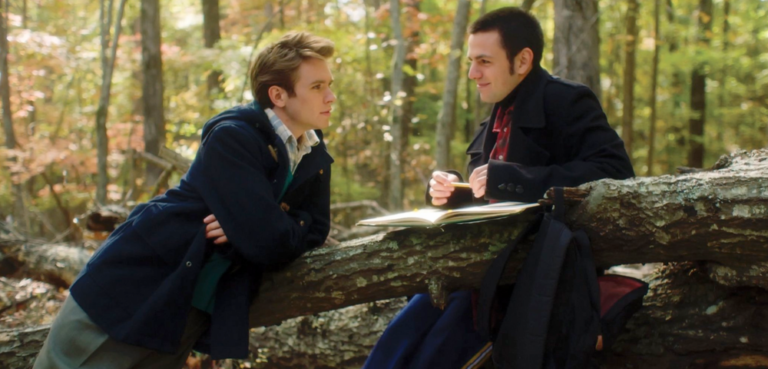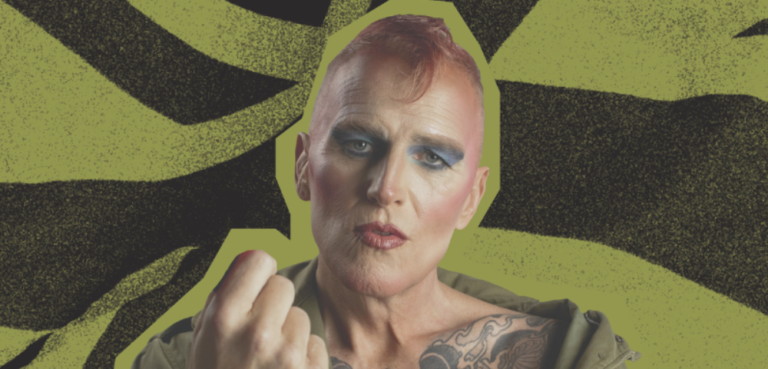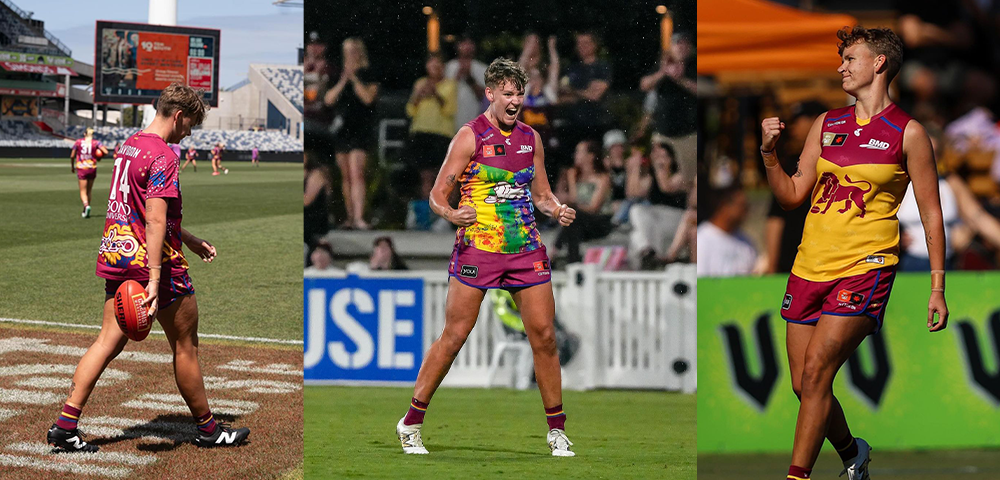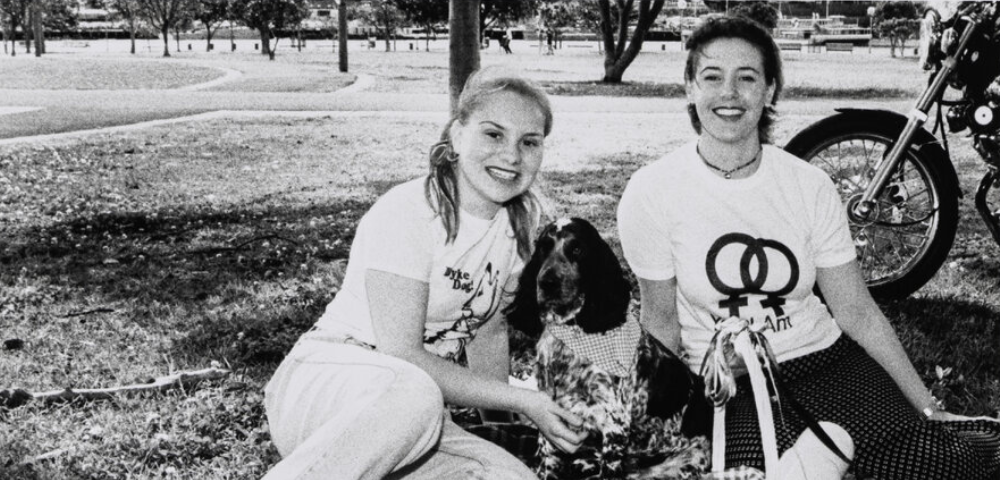

RHYIAN Anderson-Morley didn’t know his picture was going to be on the front page of The Age until he dropped by his local newsagent on the way to work.
“Nothing was confirmed until I walked into the newsagent and saw my mug looking at me,” he recalled.
After staring at the newspaper stand for a good 20 seconds, Rhyian handed over the money for the paper and nervously got on the train to work, trying to hide the image of himself in a football guernsey staring out from page one.
“Someone on the train said something like, ‘that’s you on the paper!” And I was like, ‘yeah, yeah it is.’ A few people were sitting around saying, ‘let me see, let me see.’ I tried to hide it on the train — I hadn’t even seen the article inside but everyone was like, ‘oh my god, that’s you’,” Rhyian explained, laughing.
The local Aussie Rules football player’s self-penned coming out story made international headlines when it was published in early June. Following in the footsteps of Jason Ball — who also came out to international fanfare in 2012 — the honesty of Rhyian’s story has struck a chord with many, depicting the 23-year-old as a down-to-earth guy passionate about his sport.
But the piece was almost something very different — Rhyian, an aspiring sports journalist, had originally planned to publish it anonymously on a friend’s blog. It was only when his friend suggested the piece could become a big deal that he decided to get in touch with The Age.
He contacted Rohan Connolly, a sports writer at the newspaper, who identified Rhyian’s piece as something worthy of wider attention.
“I think football’s probably been a little bit guilty of dragging the chain in terms of gay rights, when you compare it to racism and discrimination of other sorts, like sexism. So I thought a piece written by a guy who was prepared to say, ‘I’m a footballer and I’m a gay footballer,’ was topical… I thought he had some very good points to make,” Connolly said.
The journalist warned Rhyian he would effectively be outing himself publicly, but argued a piece about homophobia in football coming from someone who has had to confront it firsthand could be incredibly powerful. The two of them worked on the story together, the newspaper arranged for some photos to be taken, and the rest is history.
Well, almost.
Rhyian felt he owed it to his team to let them know what he’d planned before they read about it in the paper. He had moved to Melbourne 18 months ago to play footy, and for the past year he’s played for the Yarraville Seddon Eagles, a club in the semi-professional Western Region Football League based in Melbourne’s western suburbs.
He knew regardless of how things turned out with the article, it would be his teammates and everyone else at his club who would get him through, or not get him through. While he had told a couple of his teammates he was gay, it wasn’t widely known. So Rhyian took a brave and terrifying step.
“I thought that I had to do the respectful thing for them and front up to them at a face-to-face level. I thought it would be a bit disrespectful to them if they were finding out from reading in the paper or on social media,” he said.
“I just stood up in front of all of them and said, ‘look, there’s an article coming out that I’ve written. It’s written from the perspective of a gay player. I know two of you guys know this, but it’s probably a shock to everyone else. I’m sorry, I hope it doesn’t affect the team.’ That was my main concern, that it would affect the team. But I told them all and I was speechless from the response I got.”
Rhyian’s teammates gave him a round of applause, and once the meeting was over they drank and played cards late into the night.

Growing up in the suburbs of Adelaide, Rhyian said an upbringing without any positive gay role models left him trapped within a narrow understanding of what it meant to be gay. He made the decision to leave South Australia for Melbourne to play footy, but also to reinvent himself. He arrived knowing no one, but like many young gay men who move to the city, he wanted a chance to become who he was without the limitations of who he thought he had to be.
“When I was growing up and struggling with it I thought you were either a ‘bloke’ or you just go to gay clubs and you’re just that stereotypical gay guy. Obviously there’s nothing wrong with that — I’ve got mates who are flamboyant as ever, I don’t care. But that was my understanding of being gay,” he explained.
Coming to Melbourne helped Rhyian come to terms with the idea he could be gay as well as anything he wanted to be.
After his image was splashed across the newspaper, Rhyian worried about the sudden weight of responsibility, feeling ill-equipped as a role-model. With his story erupting on social media, he started to cop criticism from within the LGBTI community. Rhyian comes across well-spoken, intelligent and considered, but he had no idea people would pore over every word he had written on the sensitive, complex topic of homophobia in sport.
The issue has been in the public spotlight recently, as Australia’s sporting codes finally begin to make headway in addressing homophobia. The idea of openly-gay players has become a symbol not only for cultural change in sport, but for the broad acceptance of LGBTI people in Australian society. The Australian Human Rights Commission even announced this would be a new focus for the organisation, which is working with organisers of this year’s international gay rugby tournament to be held in Sydney in August, the Bingham Cup, to implement an anti-homophobia framework for the major Australian sporting codes.
Rhyian said the more drama we make about the idea of gay sportspeople, the harder it would be for them to come out. He argued the focus on whether the AFL was “ready” for a gay player, whether the fans were ready, whether the clubs were ready, is a red herring. As Rhyian has discovered firsthand, the enormity of the community’s expectations — LGBTI or otherwise — meant a lot was being asked of any player who came out.
Rhyian argued that if someone has dedicated their entire lives to becoming an elite athlete, coming out is perhaps too great an ask.
“I’m thinking of players who have played this game for 20 years or longer. All they’ve ever wanted to do in their life is play footy, the amount of hours they’ve put in, hours upon hours every day of their life to get to this level,” he said.
“The first gay AFL player who comes out about being gay, they’re always going to be the gay player. They’re never going to be referred to as John Smith the full-forward from Collingwood, or John Smith the hard-at-the-ball gut-runner from the Bulldogs. When such a big deal is made about it, I think to some degree you’re asking the player to sacrifice their identity as a player.
“The people who play footy, they want to play footy, or they wouldn’t have gone to all the effort. So I think that’s something that people forget about. Everyone’s so caught up in whether the AFL or the clubs will accept it. We know they will — there’s no way they couldn’t with all the stuff they’ve done.”
Bingham Cup Sydney president Andrew Purchas has been at the forefront of the debate with his work on the anti-homophobia framework. He conceded Rhyian’s point; perhaps in the short-to-medium term, waving the flag for diversity in sport will be an unavoidable sacrifice for a player who comes out.
“If someone does feel that they need to do it, and I think often that’s what happens, people feel like they’re living a lie and they need to be truthful to themselves,” Purchas said.
“I don’t think anyone should feel obligated to have to be the first one to come out as a professional sportsperson. What I do think we have to do is we need to work hard to make sure if they do make that decision, they know they’ll be supported and helped. Unfortunately I think it will be a media story and it’s likely to become a fuss, at least in the short term.”
It’s a catch-22 that leaves any closeted elite sportspeople out there in a difficult position. In the near-absence of out professional sportspeople, any coming out is going to be looked on as a big deal. But if no one takes the plunge, it might be a while before things start getting easier.
Rhyian knows he doesn’t have the answer, even as messages of support continue to pour in and people across Australia and the world congratulate him and thank him for making things a little easier for the next person, the inevitable next time. He hoped it would get keep getting easier.
“I think the more open and casual we are about the fact that gay blokes play footy, whether at a local or an elite level, the easier it will make it and the less of a backlash they will have,” he argued.
“But to some degree I don’t think there will be a way around it. It’s a big deal. From gay people’s perspective, if there was a gay player playing footy I probably would have jumped in and played footy a lot earlier.”
(Main image credit: Thomas Riley; Star Observer)
This article first appeared in the July edition of Star Observer. The August issue will hit the stands tomorrow (July 17) in Melbourne, Sydney, Brisbane, Adelaide and Canberra. Click here to find out where you can grab your free copy.










Whilst Rhyian is now publicly advocating a need to remove the flamboyant stereotype, an absolutely important step to make in sexuality discourse in Australia, it should be known that during his time as a law student at a regional law school in Australia, he regularly used his sexuality as a basis to claim it was legitimate to chuck a hissy fit, overreact to situations or have dramatic moments. One cannot have it both way – complain about a stereotype existing and then use it to justify his own behaviour – without then having to explain the hypocrisy which exists within his arguments.
Michael, you have any evidence of that? Or that just a wild accusation to tear someone down? Because from what I know of Rhyian, that doesn’t sound like him at all.
Also, did you actually read his article? Even if he did act in that way, he explained how he has grown over the past years and learnt about who he is and that he doesn’t have to act in a particular way. If he has grown since then why would you try and drag him back down to that level?!
Also, I seriously doubt your comment considering that he has never lived in Regional Australia. Hows about not engaging in that negative behaviour which you claim to be encouraging?!
I have learned something about moving to a small to mid country town called Forbes in NSW about a year and a half ago. I learned that people can be very friendly and open about there opinions on others and just right out and say it. Also I have learned that sitting in a pub by myself playing keno (my 5 numbers are 19, 31, 33, 44 and 69), that a man who is a complete random stranger and does not know me from a bar of soap completely drunk and off his face (originally from Sydney as I was too) that the universe has a way of giving you a lesson in life. That lesson happened when he came up to me and tapped me on the shoulder and asked me if I was gay and I denied it at first (to protect myself because he is a 67 year old male and I am only 27 with very limited experience) but a week later found out that he knew I was gay for real because I told him a week later and said this quote “if you can guess that I am gay – then try you luck on guessing 10 numbers on keno and win $1 million”. We have become good friends from that day afterwards and have a good drink!
If the next random complete stranger male or female can guess that I am gay, I will give them $3 per $1 bet!
It’s nice to see someone like this guy helping demystify stereotypes. I’m tired of having to wear so much of the “flamboyant” assumptions that dominate the mainstream perception of what it means to be gay. No wonder so many take so long to come out… Perhaps the focus also needs to be on the kind of environment we (in the scene) create for the quiet and silent ones who arent comfortable being in it. Bravo Rhyian!